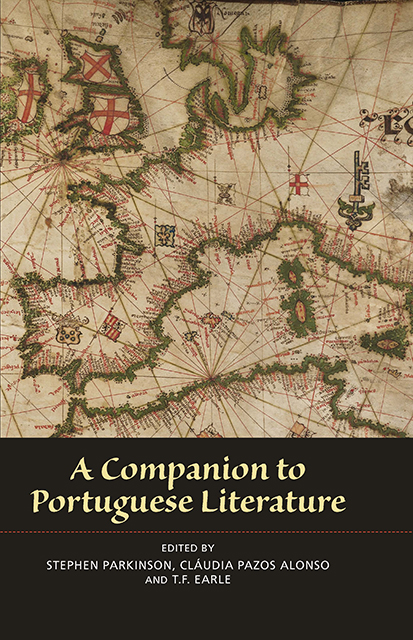Book contents
- Frontmatter
- Contents
- Acknowledgements
- Notes on the Contributors
- Introduction
- 1 Eight Centuries of Portuguese Literature: An Overview
- 2 The Medieval Galician-Portuguese Lyric
- 3 Fernão Lopes and Portuguese Prose Writing of the Middle Ages
- 4 Portuguese Theatre in the Sixteenth Century: Gil Vicente and António Ferreira
- 5 The Lusiads and the Literature of Portuguese Overseas Expansion
- 6 Lyric Poetry in the Sixteenth Century
- 7 The Seventeenth Century
- 8 The Eighteenth Century
- 9 Almeida Garrett: Founder of Modern Portuguese Literature
- 10 The Transition from Romanticism to Realism: Alexandre Herculano, Camilo Castelo Branco and Júlio Dinis
- 11 Eça de Queirós: A European Writer
- 12 Fernando Pessoa and the Modernist Generation
- 13 Narrative and Drama during the Dictatorship
- 14 Women Writers up to 1974
- 15 Writing after the Dictatorship
- 16 Portuguese Literature in English Translation
- Index
16 - Portuguese Literature in English Translation
Published online by Cambridge University Press: 03 March 2023
- Frontmatter
- Contents
- Acknowledgements
- Notes on the Contributors
- Introduction
- 1 Eight Centuries of Portuguese Literature: An Overview
- 2 The Medieval Galician-Portuguese Lyric
- 3 Fernão Lopes and Portuguese Prose Writing of the Middle Ages
- 4 Portuguese Theatre in the Sixteenth Century: Gil Vicente and António Ferreira
- 5 The Lusiads and the Literature of Portuguese Overseas Expansion
- 6 Lyric Poetry in the Sixteenth Century
- 7 The Seventeenth Century
- 8 The Eighteenth Century
- 9 Almeida Garrett: Founder of Modern Portuguese Literature
- 10 The Transition from Romanticism to Realism: Alexandre Herculano, Camilo Castelo Branco and Júlio Dinis
- 11 Eça de Queirós: A European Writer
- 12 Fernando Pessoa and the Modernist Generation
- 13 Narrative and Drama during the Dictatorship
- 14 Women Writers up to 1974
- 15 Writing after the Dictatorship
- 16 Portuguese Literature in English Translation
- Index
Summary
Relatively few histories of Portuguese literature have been written in English, perhaps because the subject is unlikely to attract sufficient readers to justify such an undertaking and there is a general assumption that anyone with an interest in this subject will have, at the very least, a reading knowledge of Portuguese. This rationale inevitably excludes readers with an interest in comparative literature who do not possess the required linguistic knowledge. Histories of the translation of Portuguese literature into English are even scarcer: the potential readership is extremely small, and the information required to produce such a history is difficult to locate. And yet, works of Portuguese literature have been translated into English – from Portuguese, Latin and Spanish – for more than six centuries and for the most varied reasons. It is not easy to arrive at a complete overview of this intercultural activity: the timespan in question is simply too long, the translated works do not belong to one specific genre and could never have been aimed at a single, homogeneous readership. Works have been translated because their content is deemed to have some intrinsic value or aesthetic quality, because of their social, cultural or political significance, or on account of some particular relevance for potential readers. In any event, translations do not happen by accident: for every translation that makes it into print, other potential translations have been left by the wayside.
Information about Portuguese literature translated into English may at first seem sparse but a reasonable amount can be tracked down and pieced together from surveys beginning with Thomas in the first half of the twentieth century.
Some works have been translated and published in English within just a few years of their first appearance in print. The legacye or embassate of the great emperour of Inde prester Iohn, vnto Emanuell kyng of Portyngale, in the yere of our lorde M.v.C.xiii, was printed in 1533, the year after the publication of Damião de Gois's Latin original.
What readers may find surprising, however, is the length of time that can elapse between the date of composition or publication of a text or corpus of texts, and its first appearance in English. This is very much the case of the medieval Galician-Portuguese lyrics, composed between the twelfth and fourteenth centuries, but not translated until the late nineteenth or early twentieth.
- Type
- Chapter
- Information
- A Companion to Portuguese Literature , pp. 202 - 214Publisher: Boydell & BrewerPrint publication year: 2009

